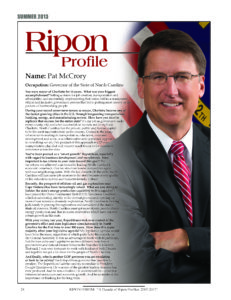…from the Summer 2013 edition:
Occupation: Governor of the State of North Carolina
You were mayor of Charlotte for 14 years. What was your biggest accomplishment? Setting a vision for job creation, transportation and affordability and successfully implementing that vision within a transparent, ethical and inclusive governance process that led to putting more money in the pockets of hardworking people.
During your record seven-term tenure as mayor, Charlotte became one of the fastest growing cities in the U.S. through burgeoning transportation, banking, energy, and manufacturing sectors. How have you tried to replicate that success for the entire state? It’s my job as governor to make every county, city and town successful on its own, not to replicate Charlotte. North Carolina has the private, public and human capital to be the most successful state in the country. Central to the many reforms we’re making in transportation, education, economic development and so on, is a collaborative and systematic approach to everything we do. One product of this approach is a 25-year transportation plan that will connect small towns to the centers of commerce across the state.
You’ve been praised as a “smart growth” Republican, especially with regard to business development and recruitment. How important is tax reform in your state toward this goal? The tax reform we achieved was central to leading North Carolina’s economic comeback. Our tax structure is now competitive again with our neighboring states. With the tax obstacle off the table, North Carolina will lure more job creators to the state because of our quality of life, education system and business friendly culture. Recently, the prospect of off shore oil and gas exploration near Cape Hatteras has been increasingly raised.
What are you doing to bolster the state’s energy production capability in this capacity? I have joined the Outer Continental Shelf (OCS) Governors Coalition which is advocating directly to the federal government opening up more of our waters to domestic exploration. North Carolina is moving judiciously in pursing the exploration and extraction of the state’s shale oil reserves. North Carolina must get more deeply involved into energy production and that includes renewables which have enjoyed robust growth in this state.
With your victory last year, Republicans took over control of the governor’s office and state legislature simultaneously in North Carolina for the first time in over 100 years. How does this super majority affect your legislative agenda? My legislative agenda would have been the same, regardless of which party held the majority in the General Assembly. It was an advantage to work with Republicans, but the Executive and Legislative are two diff erent branches of government and natural tension between the branches is inherent. That said, I was very fortunate to work with leaders of both Houses and together we got a lot done for the people of North Carolina.
And finally, who is another GOP governor you are emulating or look to for advice? Each Republican governor has qualities to emulate. The Republican I admire and try to emulate is President Dwight Eisenhower. He was one of the greatest leaders America has ever produced. And he was a builder. He understood the connection between infrastructure and economic growth. And he understood the importance of thinking for the long term.





